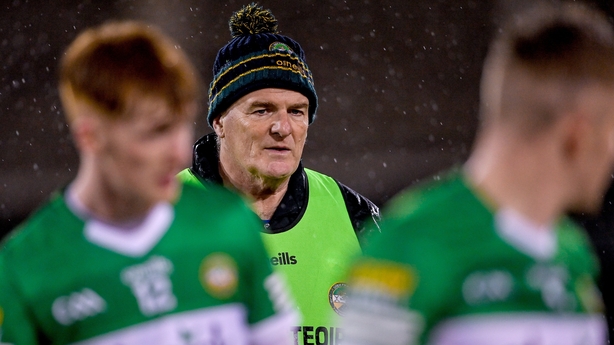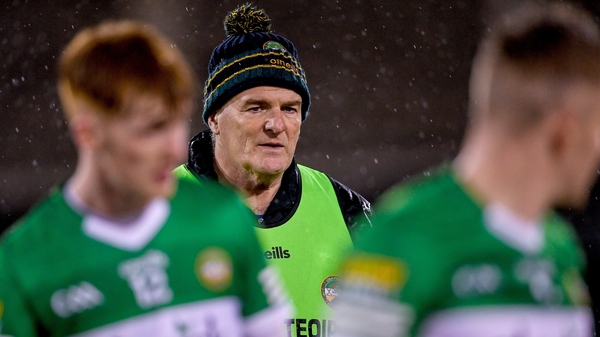The dear old O'Byrne Cup has taken a pasting this week and been branded the sick man of the pre-season competition circuit.
On the evidence of 2023, it may have gone well past sick and into the critical category and it could soon be comatose altogether.
Many of its combatants are also dogged by sickness this winter. Carlow pulled out of their re-fixed dead rubber clash with Laois yesterday, citing "sickness, injuries and Sigerson", the unholy Trinity which has wreaked such havoc with the schedule.
Louth weren't enthused by the prospect of travelling down to Wexford on a Wednesday night for an immaterial fixture. After initially enquiring as to whether it would be possible to move the game to somewhere less... far away, they conceded the fixture.
With two wins from two, they were bound for the semis in any event.
Kildare, meanwhile, offered a walkover to Westmeath, Glenn Ryan confirming that they were unable to field. Sigerson commitments were instanced in the press as the primary reason.
With the legitimacy of the competition having already taken a battering, things took a turn for the farcical by Friday, with Offaly, fresh from a first senior victory over Dubs in over 22 years, conceding their semi-final against Louth.
The possibility was well flagged by manager Liam Kearns on Wednesday, who marked their three-point away win in the capital by telling the streaming outfit Clubber.ie that he wouldn't mind pulling out of the competition altogether.
The Kerry native explained the integrity of the thing was "shot" anyway on account of Louth handing a walkover to Wexford, thereby giving themselves a midweek rest.

On Thursday, prior to Offaly's withdrawal, Leinster secretary and CEO Michael Reynolds admitted to Sean Moran in the Irish Times that a switch to a knockout format "would have to be considered."
By Friday afternoon, the Leinster Council were reduced to issuing a rather impotent statement, acknowledging that the plethora of walkovers meant "the integrity of the competition had been diminished."
"In future, counties will have to give serious consideration to their fixture schedule before committing to participating," they sighed.
The death knell of the O'Byrne Cup - and its less maligned brother tournaments in the other provinces - has been sounded often over the years and by the end of this week, those bells were ringing louder than ever.
But former Wexford manager Shane Roche firmly rejects the idea that the competition should be done away with - and argues that much of the problems this week stemmed from the Leinster Council's failure to penalise Louth for their initial withdrawal from Wednesday's fixture in the south-east.
"It's very disappointing to see," Roche told RTÉ Sport.
"Everyone will have a large panel at this time of year. I think counties have to fulfil the fixtures. Whether that's with development players of under-20 players. But counties have to fulfil the fixtures.
"There should be a penalty. And from dealing with county boards, the only way that county managers will face a challenge within is if there's a hefty fine.
"If there was a removal from the competition, as well as a fine, that would have deterred everyone else. If they were to have handed out a €5,000 or a €10,000 fine, I'm pretty sure teams would be finding the strength in depth in their panels to fulfill these fixtures.
"Once Louth did it and there was no repercussions, there was no ban or fine, and they were still going to be in the competition, I think everyone decided to suit themselves and do their own thing."
While player welfare was cited as the reason for Offaly's withdrawal on Friday, in his post-match interview in Parnell Park, Kearns seemed more agitated by the absence of an even playing field for Sunday's game, due to Louth's consequence-free walkover.
"I don't know what I would have done in the same situation," says Roche.
"But it would irk you that a team was able to give a walkover, get through to the semi-finals, be resting up, preparing for a game and you're out on a Wednesday night in Parnell Park, fighting to get through. And then you're out again four days later against a team that had just opted to take the week off."
In the search the create space in the GAA's cluttered calendar, the pre-season competitions are regularly offered up as the low-hanging fruit. If they were ditched, so the argument goes, no one much would miss them.
Roche managed Wexford from late 2020 until the end of the last year's campaign, guiding them to Leinster Championship wins against Wicklow in 2021 and an unlikely victory over Offaly in 2022, as well as a famously competitive showing against Dublin in 2021, a match which offered an early signal that Dessie Farrell's side were off-colour that summer.

While the pandemic did for the pre-season competitions in 2021, Roche, as in his playing career, found them "hugely beneficial" in 2022.
"You'd have your pre-season in November, December," Roche says. "You'd have a large panel, a mix of your panel from the year before, plus some lads from development squads.
"If guys go back in early December - when you consider the amount of training they would have done in December and the gym training before that, I think lads would be absolutely itching to get games.
"You get to the O'Byrne Cup in January and it puts massive structure on it. Because you're guaranteed three competitive games. You're looking at one week of training, an As v Bs. And then you've one week to the National League. I always found it put great certainty and structure on it.
"We would have had four or five Sigerson players. But you'd have such a large panel that there would have been rotation. The O'Byrne Cup games last year would have been Saturday/Wednesday/Saturday. Our Sigerson players would have played the two Saturdays and we left them out for the Wicklow game on Wednesday, when they were playing Sigerson."
In the absence of pre-season competitions, Roche argues teams would be anxious to arrange challenge matches, which are often vulnerable to late cancellation.
The O'Byrne Cup, at least until this year, was more secure.
"Two years ago, we were coming out of Covid. We had four challenge games organised coming into the league - which was played in May that year - and all four, for whatever reason, fell away and we were left with no game."


